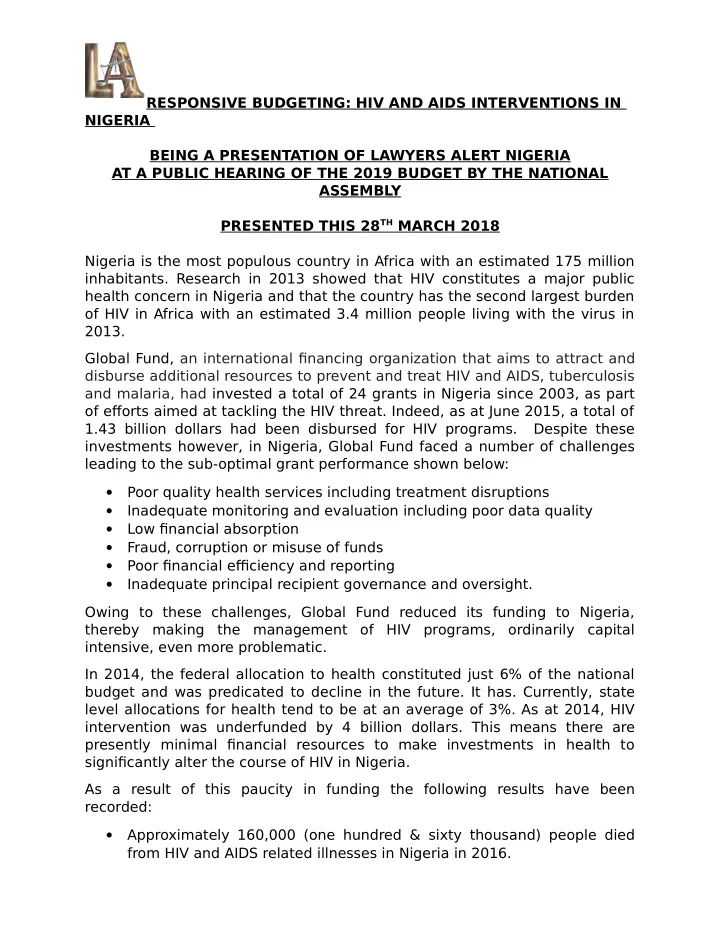

RESPONSIVE BUDGETING: HIV AND AIDS INTERVENTIONS IN NIGERIA BEING A PRESENTATION OF LAWYERS ALERT NIGERIA AT A PUBLIC HEARING OF THE 2019 BUDGET BY THE NATIONAL ASSEMBL Y PRESENTED THIS 28 TH MARCH 2018 Nigeria is the most populous country in Africa with an estimated 175 million inhabitants. Research in 2013 showed that HIV constitutes a major public health concern in Nigeria and that the country has the second largest burden of HIV in Africa with an estimated 3.4 million people living with the virus in 2013. Global Fund, an international fjnancing organization that aims to attract and disburse additional resources to prevent and treat HIV and AIDS, tuberculosis and malaria, had invested a total of 24 grants in Nigeria since 2003, as part of efgorts aimed at tackling the HIV threat. Indeed, as at June 2015, a total of 1.43 billion dollars had been disbursed for HIV programs. Despite these investments however, in Nigeria, Global Fund faced a number of challenges leading to the sub-optimal grant performance shown below: Poor quality health services including treatment disruptions • Inadequate monitoring and evaluation including poor data quality • Low fjnancial absorption • Fraud, corruption or misuse of funds • Poor fjnancial effjciency and reporting • Inadequate principal recipient governance and oversight. • Owing to these challenges, Global Fund reduced its funding to Nigeria, thereby making the management of HIV programs, ordinarily capital intensive, even more problematic. In 2014, the federal allocation to health constituted just 6% of the national budget and was predicated to decline in the future. It has. Currently, state level allocations for health tend to be at an average of 3%. As at 2014, HIV intervention was underfunded by 4 billion dollars. This means there are presently minimal fjnancial resources to make investments in health to signifjcantly alter the course of HIV in Nigeria. As a result of this paucity in funding the following results have been recorded: Approximately 160,000 (one hundred & sixty thousand) people died • from HIV and AIDS related illnesses in Nigeria in 2016.
About 220,000 (two hundred and twenty) new infections were • recorded. Out of 3,200,000 (three million, two hundred thousand) people living • with HIV in 2016, ONLY 30% have access to antiretroviral therapy . Only 21% of the estimated 270,000 (two hundred and seventy • thousand children, ages 0-14 years) in Nigeria living with HIV have access to antiretroviral treatment. Children, especially females, dropping out of school to cater to the • needs of infected parents who are sick. Simply put, the number of people living with HIV and those afgected by it, is now disproportionate compared to the funds budgeted for treatment. This is a tide which must be stemmed and quickly too. Note that an estimated 1.8 million children have been orphaned by AIDS, thereby taking a huge toll on their health, safety and wellbeing. In many instances, elderly grandparents, many of whom tend to be struggling with physical infjrmities and fjnancial challenges of their own, have to bear the responsibility for these children. Incidentally, the National Strategic Framework, 2017-2021, aims (amongst others) at ending AIDS by achieving zero new infections and zero AIDS related deaths. This goal can only be described as utopian at the moment owing to the meager funds allocated to curbing the scourge. 2021 is just 3 years away . What successes have been recorded in tackling HIV? Do we have a tragic case here of “one step forward, two steps backwards”? The adage “Health is wealth”, has never been more apt than it is now. Our biggest resource in Nigeria at the moment does not lie in the ground in the form of black gold, NO. It lies on the surface of the earth in the form living breathing beings, you and I, who form the bulk of the wealth of this great land. It lies in our human capital. Safeguarding the health of all Nigerians, especially from problems such as HIV, is therefore a task that the Federal Government must embark upon with all sense of urgency. Of what use would any other achievements be if we were all too sick to benefjt from them? If health, and by association, HIV and AIDS programs, are not adequately funded and managed with a view to prioritizing the well- being of citizens, all other budgets would amount to nothing because there might actually be no Nigerians left to enjoy them. It is therefore imperative that this National Assembly pay heed to the neglect in this sector and take steps to redress the shortfall in funding. This is critical given that international support has drastically dropped as cited above. Failure to do this by the National Assembly could translate to an inability to meet the goal of the National Strategic Framework within the proposed time frame of 2017-2021.
Lawyers Alert therefore, seeks a proved and specifjc funding, beyond the health sector, for HIV and AIDS interventions by provision of adequate anti- retroviral therapy to enhance access for persons living with HIV. In addition, we seek adequate provision of commodities and services to promote absolutely free testing including the provision of efgective mother to child transmission Medicare. The National Assembly is so urged. Thank you.
Recommend
More recommend